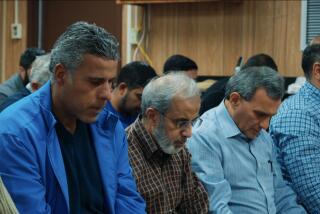ISLAM RISING : Bosnia : The Faithful in Embattled State Follow Unique Path : More secular than some Muslims, they reject Serbs’ charges that they want a fundamentalist government.
SARAJEVO, Bosnia-Herzegovina — It was the night after Serbian rebels first attacked her city that Sarajevo University math professor Naza Tanovic was explaining to dinner guests why she doesn’t fast during Ramadan.
“I can’t do theorems when I’m hungry,” said the Muslim Slav, adding that she nevertheless considered herself among the faithful. “I’m sure it says in the Koran somewhere that those who are doing important work don’t have to fast.”
Her husband rolled his eyes skyward, her guests covered their smiles with napkins and her brother Bakir said what everyone was thinking:
“What a bunch of bull! What would you know about the Koran?”
Like Tanovic, most of the 2 million citizens of Bosnia-Herzegovina who call themselves Muslims have molded their faith to accommodate a lifestyle far more liberal than would be tolerated in fundamentalist states. The Muslims of Bosnia are not now--nor have they ever been--traditional followers of Islam.
Bosnians who consider themselves Muslims are the descendants of a schismatic Christian sect, the Bogomils, that developed among the Slavs of feudal Bosnia. Denounced as heretics by both Orthodox Christians and Roman Catholics, the Bogomils for centuries suffered persecution by the dominant religions.
After the Ottoman Turks conquered neighboring Serbia at the Battle of Kosovo in 1389, the Islamic victors offered the Bogomils protection from their Orthodox and Catholic tormentors in exchange for guarantees of peaceful submission to Ottoman rule and counting themselves among its faithful.
Bosnia’s Bogomils called themselves Muslims after their “conversion,” thus forming a third ethnic group defined by religion--following the Orthodox Serbs and Catholic Croats--from among the Slavs who had migrated to the Balkans nearly a millennium earlier.
Under Ottoman protection, the Bosnian Muslims flourished and built mosques and markets in the style of the occupying power. But throughout the nearly 500 years that Turkey ruled Bosnia, its influence was more cultural than religious. Local Muslims adopted their rulers’ practices in farming and government, but the faith taken on for convenience never developed much intensity.
When the Ottoman Empire crumbled and its land was partitioned by the 1878 Congress of Berlin, Bosnia entered a century of non-Islamic rule that further eroded the Muslims’ religious identity.
The Catholic Austro-Hungarian Empire occupied and governed the region until World War I, after which it became part of the multicultural Yugoslav federation.
During four decades of Communist rule when atheism was officially encouraged, Bosnia’s Muslims migrated from farms to cities to take jobs in the new industries that sprang up throughout the republic after World War II. Most adult women entered the factories and, as in all Communist countries, girls enjoyed equal educational and social rights with boys.
In the early 1970s, under pressure from Muslim activists like current Bosnian President Alija Izetbegovic, Yugoslav strongman Josip Broz Tito granted the Bosnian Muslims the status of “nation” in recognition of the cultural differences separating them from Serbs and Croats.
By the time Yugoslavia began fracturing at the start of this decade, strict adherence to Islamic tradition had largely withered except in isolated rural communities. Western dress and lifestyles were prevalent among Muslims who made up the majority in urban centers like Sarajevo.
The secular nature of Bosnian society has caused many who call themselves Muslims to react with resentment to Serbian rebel accusations that they are seeking to establish an Islamic state.
Muslims, who made up 44% of the prewar population, and Croats, who accounted for 17% of the 4.4 million Bosnians, formed the bulk of the republic’s majority vote for independence last year. That vote sparked an armed rebellion by nationalists in the Serbian minority who refuse to be politically separated from Serbs in other states.
To provide a socially acceptable excuse for what has been internationally condemned as unjustified aggression, the Bosnian Serbs and their patrons in Belgrade claim they are waging war to protect themselves and Europe from a Muslim fundamentalist takeover.
Sarajevo government leaders--who are now mostly Muslims but who represented all three major ethnic groups before the war broke out--reject such claims.
Despite Bosnians’ unconventional embrace of Islam, their plight at the hands of Serbian gunmen has provoked angry reactions in Muslim countries, whose leaders see Western reluctance to protect the Bosnian Muslims as evidence of prejudice and neglect by the Christian world.
Some efforts to help Bosnia have been undertaken by Islamic countries, such as Iran’s failed attempt to send weapons and ammunition last December in violation of a U.N. arms embargo applying to all former Yugoslav republics. As many as several hundred Islamic mercenaries are also reported to be in Bosnia, but their effectiveness has been hampered by language barriers and resistance to the involvement of “holy warriors” even by the Bosnian Muslims they have come to help.
The Organization of the Islamic Conference, representing 50 Muslim countries, has lobbied for exempting Bosnia from the arms embargo, but its appeals have failed, and threats of unilateral action have not been fulfilled.
The past year of violence and brutality against the Muslims has caused some previously secular Bosnians--especially victims of rape--to seek solace in their long-neglected religion, according to aid workers at Bosnian refugee camps.
But social commentators argue that fundamentalism will never gain a foothold in Bosnia because most of the Muslims there greatly prefer the European way of life to the restrictive mores of Islam.
“Our women like their miniskirts and our men like their drink,” the deputy editor of Sarajevo’s daily Oslobodjenje, Mehmet Husic, observed on the subject of fundamentalism’s future in Bosnia. “If anyone ever tried to ban such things, you would see a real revolt.”
More to Read
Sign up for Essential California
The most important California stories and recommendations in your inbox every morning.
You may occasionally receive promotional content from the Los Angeles Times.











